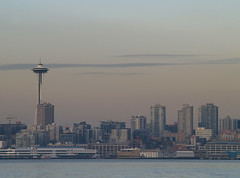
The current high pressure over the area makes our skies clear and cold, but this is also causing our air to be more stagnant. Wood smoke adds to the problem, turning our clear winter air to a dull smog.
Information about the burn ban, according to the Puget Sound Clean Air Agency:
No burning is allowed in fireplaces or uncertified wood stoves. Residents should rely instead on their home’s other, cleaner source of heat (such as their furnace or electric baseboard heaters) for a few days until air quality improves, the public health risk diminishes and the ban is cancelled. The only exception is if a wood stove is a home’s only adequate source of heat.
No outdoor fires are allowed. This includes recreational fires such as bonfires, campfires and the use of fire pits and chimineas.
Burn ban violations are subject to a $1,000 penalty.
It is OK to use natural gas, propane, pellet and EPA certified wood stoves or inserts during a Stage 1 burn ban.
The Washington State Department of Health recommends that people who are sensitive to air pollution limit time spent outdoors, especially when exercising. Air pollution can trigger asthma attacks, cause difficulty breathing, and make lung and heart problems worse. Air pollution is especially harmful to people with lung and heart problems, people with diabetes, children, and older adults (over age 65).
For more information, see the Puget Sound Clean Air Agency website.
